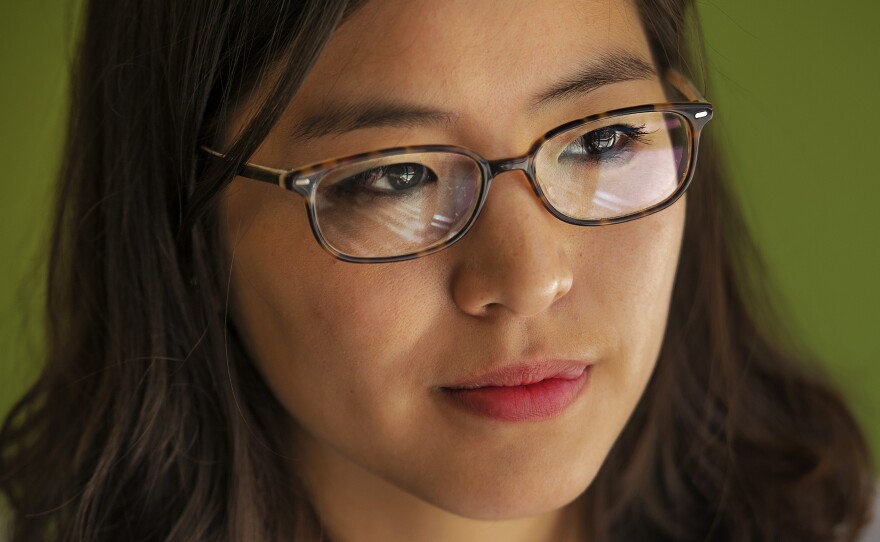Two high-school sophomores — Ethan Wynkoop and Ti-Anna Chen — sneak away from their homes in suburban Washington, D.C., and fly to Hong Kong. They're searching for Ti-Anna's father, a Chinese emigre and dissident who believes that China is just a spark away from democratic revolution.
He's gone missing after landing in Hong Kong, and Ti-Anna is determined to find out what happened. Ti-Anna is based on a real person, and her story is now part of a new young-adult novel — a thriller — by Fred Hiatt, who also holds down a day job as editorial page editor of The Washington Post.
Fred Hiatt and Ti-Anna Wang, the real young woman behind the story, stopped by to chat with NPR's Melissa Block.
Interview Highlights
Wang, on the origin of her name
"I was born in 1989, and my father, being a democracy activist, he was paying a lot of attention to what was going on in Tiananmen, in Beijing, at that time, so after the massacre, he named me Ti-Anna to commemorate the victims ... and also to celebrate the ideals of freedom and democracy. He really wanted to remember their courage."
On the disappearance and imprisonment of her father, democracy activist Wang Bingzhang
"In 2002, my father went on a trip to Vietnam. He was hoping to meet with labor activists near the Chinese-Vietnamese border when he was kidnapped and forced into China on a boat. He was, you know, blindfolded, beaten, gagged, and then left at a temple to be picked up by Chinese police within minutes of being left there, so that's the story that he told us.
"After his arrest, he was subsequently charged with terrorism and espionage. He had a one-day trial and then [was] found guilty of those charges, and sentenced to life in prison.
"The last letter I got [from her father], a month-and-a-half ago ... the part that I remember the most from the last letter was, he apologized for the amount of pain that he's caused my family in the past 10 years, but also said that he had no regrets, because he felt like he responded to his calling.

"I think his psychological health is what worries my family more than anything. He, himself, is losing hope in the possibility of freedom, and that's really difficult."
Hiatt, on discovering the story of Wang and her father
"I hadn't really focused on him until late 2008, when, at The Washington Post, we received a beautiful op-ed about his case, which happened to be written by Ti-Anna Wang, who at the time was just out of high school and had come to Washington to spend a year to try to bring attention to her father's case. So I read the op-ed, we published it, and then I asked if she wanted to get a cup of coffee — I just wanted to meet this obviously unusual young person.
"It struck me as quite courageous that she had left Montreal and moved to Washington, really without any contacts, and I think I was also struck by the name and the expectation — of course, it's a beautiful name, and it's beautiful to commemorate the democracy aspirations of Tiananmen Square, but also what a burden for a young person to have to live up to, in a sense, and I think that struck me."
Wang, on whether her name is a burden
"I guess a little bit. It feels more like a responsibility. I think, in the novel, the fictional Ti-Anna and I feel like, given the circumstance — in her case her father's disappearance, and in my case my father's imprisonment — it's kind of inescapable that we feel like we have to respond to sort of the responsibility that was given to us, that's embedded in our names."
Hiatt, on deciding to turn Wang's story into a young-adult novel
"It sort of decided itself for me ... I thought it was going to be the story of Ethan and his adventure in Asia, and as I wrote, the Ti-Anna character, which I appropriated at the time without permission or without even telling or asking Ti-Anna, just kind of became a more and more important part of the story, until really it was a story of the two of them, and their friendship, and the adventure they go on together."
Wang, on discovering her role in the novel
"It took me completely by surprise. The conversations about human rights in China, they can be a little numbingly familiar after you talk about it. You say the same sort of things about what's going on, what's going on with your father, and the fact there's not much progress — it's marked by a lot of stagnation. So having a book and finding a new, creative approach to talking about human rights issues, it's really inspiring for me, too."
Hiatt, on whether he hopes Nine Days will help raise awareness of Wang Bingzhang's case
"I do hope that, and Ti-Anna and I each wrote afterwords for this book, and Ti-Anna's is quite beautiful, but I think we'd both be very happy to write different afterwords for the paperback."
Copyright 2023 NPR. To see more, visit https://www.npr.org. 9(MDAzMjM2NDYzMDEyMzc1Njk5NjAxNzY3OQ001))





